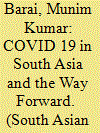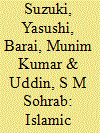| Srl | Item |
| 1 |
ID:
177769


|
|
|
|
|
| Summary/Abstract |
The world has been experiencing an unprecedented level of disruptions of all activities since COVID-19 began to spread in China in late 2019 and then turned into a truly global pandemic within a couple of months. A year after, millions of people in over 219 countries and territories have either got infected or died of the disease (Worldometer, 2021). Indeed, COVID-19 has only one close parallel in the recent past by its disruptive ability, though differently. The Global Financial Crisis of 2007–2008 started in the US housing market that engulfed the entire world’s economic and financial system.1 Similarly, COVID-19 began from Wuhan in China and then has spread out very quickly to affect the entire human civilisation in one way or another. So, both could be traced to a single individual source but with global ramifications. However, the extent of damage of COVID-19 has become much greater, larger and long-term in orientation. Herein, a pertinent question arises: is there a correlation between the degree of globalisation and the quickness of the spread of both the catastrophes and the degree of their damage? The answer is ‘yes’.
|
|
|
|
|
|
|
|
|
|
|
|
|
|
|
|
| 2 |
ID:
127079


|
|
|
|
|
| Publication |
2013.
|
| Summary/Abstract |
With diverse histories and attitudes toward risk-taking, different financial systems have a common aim: ensuring financial stability and efficiency within a geographical region. But differences exist between various financial systems as a result of their evolution and adaptation to their surrounding environment. This paper aims to analyze the incentive and sanction mechanisms of the Islamic mode of banking and the Grameen Bank model of microcredit in Bangladesh, and how they help ensure their financial stability and efficiency. We challenge the conventional explanations of their success. We point out that the informal sanction mechanisms embedded in the two modes of financial intermediation - avoiding non-compliance with Islamic Shari'ah (revealed divine law) in the case of Islamic banking, and kinship-based groupings or gushtis in the case of microcredit - play important roles in lowering the transaction costs of screening and enforcing contracts. We also point out how bank rent opportunity - the promised return from non-participatory financing and a high spread supported through low-cost funds provided by donor agencies and compulsory savings - is captured in each of the two modes, playing a further important role in maintaining their franchise values, given the specificities of the Bangladeshi financial context.
|
|
|
|
|
|
|
|
|
|
|
|
|
|
|
|